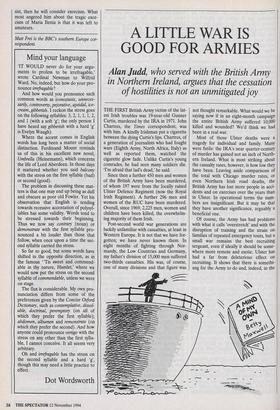A LITTLE WAR IS GOOD FOR ARMIES
Alan Judd, who served with the British Army
in Northern Ireland, argues that the cessation of hostilities is not an unmitigated joy
THE FIRST British Army victim of the lat- est Irish troubles was 19-year-old Gunner Curtis, murdered by the IRA in 1971. John Chartres, the Times correspondent, was with him. A kindly Irishman put a cigarette between the dying Curtis's lips. Chartres, of a generation of journalists who had fought wars (Eighth Army, North Africa, Italy) as well as reported them, watched the cigarette glow fade. Unlike Curtis's young comrades, he had seen many soldiers die. `I'm afraid that lad's dead,' he said.
Since then a further 450 men and women of the British Army have been murdered, of whom 197 were from the locally raised Ulster Defence Regiment (now the Royal Irish Regiment). A further 296 men and women of the RUC have been murdered. Overall, since 1969, 2,225 men, women and children have been killed, the overwhelm- ing majority of them Irish.
Post-second world war generations are luckily unfamiliar with casualties, at least in Western Europe. It is not that we have for- gotten; we have never known them. In eight months of fighting through Nor- mandy, the Low Countries and Germany, my father's division of 15,000 men suffered two-thirds casualties. His was, of course, one of many divisions and that figure was not thought remarkable. What would we be saying now if in an eight-month campaign the entire British Army suffered 10,000 killed and wounded? We'd think we had been in a real war.
Most of those Ulster deaths were a tragedy for individual and family. Many were futile: the IRA's near quarter-century of murder has gained not an inch of North- ern Ireland. What is most striking about the casualty rates, however, is how low they have been. Leaving aside comparisons of the total with Chicago murder rates, or even Northern Irish road deaths, the British Army has lost more people in acci- dents and on exercises over the years than in Ulster. In operational terms the num- bers are insignificant. But it may be that they have another significance, arguably a beneficial one.
Of course, the Army has had problems with what it calls 'overstretch' and with the disruption of training and the strain on families of repeated emergency tours, but a small war remains the best recruiting sergeant, even if ideally it should be some- where more remote and exotic. Ulster has had a far from deleterious effect on recruiting. It shows that there is somethl- ang for the Army to do and, indeed, in the wake of Bloody Sunday there was a surge in applicants for the Parachute Regiment.
The conflict has certainly improved the Army's marksmanship, which had been shamefully neglected, and it must have been generally beneficial in terms of opera- tional practice, promotion, flexibility, disci- pline, sense of purpose and morale. After 25 years of policing civil strife and accepting severe tactical restraint, always in difficult and sometimes in disastrous circumstances, it says a great deal for the British Army that it has emerged with its reputation not only intact but enhanced. Few other armies would have coped as well. Lack of purpose and the sense that no one wants what we can contribute is lower- ing for all of us, but Northern Ireland has given the Army unanswerable purpose and public presence. Disciplinary problems are fewer when battalions are on active service, soldiers are less inclined to leave, and are more engaged in what they are doing. Many preferred service in Ulster to the boredom of barracks and peacetime train- ing on the mainland or in Germany. There is a difference, evident even in this very small war, between patrolling on exercise and going out with a full magazine, one up the spout and the chance — however statis- tically unlikely — of being shot or blown up. It matures people and at the same time makes them feel more vividly alive.
A little war is good for armies; it sharp- ens their teeth and keeps them lean. A constant but not too draining haemorrhage of casualties is a reminder of what you're there for and adds point to training. Many who fought in the Falklands would have served in Ulster and were probably better for it. Perhaps the best soldiers are the young and keen who have been bloodied but not badly mauled. Old soldiers know too many dodges and are too busy fading away. Armies that have known only peace Put on weight, especially at general staff level, and then the starkness of their pro- fession comes as a brutal surprise. 'The task of the infantry,' wrote Field Marshal Montgomery, 'is to find the enemy and kill him.' It is better not to forget that than to have to relearn it.
The British Army took its modern form in the 1680s, prompted by 'the present troubles in Ireland'. Since then, it is said there has been only one year in which it has not been on active service somewhere (well served throughout by soldiers from all parts of Ireland). Certainly, 1968 is reck- oned the only such year since the end of the second world war. Whether or not Bosnia ensures that no other is in sight, the possibility of a lasting Ulster peace, wel- come as it is, may well be unsettling for the Army. Northern Ireland must be woven into its institutional fabric, for ill and good, and peace might strengthen the grip of its real oldest enemy: HM Treasury.
Alan Judd is the author of A Breed of Heroes.



































































 Previous page
Previous page